牛津译林版6B英语Unit 3-4复习资料
牛津译林版英语 六年级下册 Unit 3 A healthy diet 知识点与练习
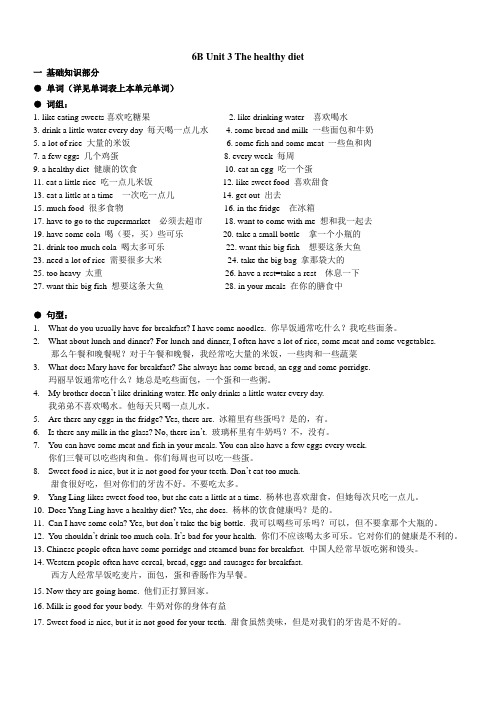
6B Unit 3 The healthy diet一基础知识部分●单词(详见单词表上本单元单词)●词组:1. like eating sweets喜欢吃糖果2. like drinking water 喜欢喝水3. drink a little water every day 每天喝一点儿水4. some bread and milk 一些面包和牛奶5. a lot of rice 大量的米饭6. some fish and some meat 一些鱼和肉7. a few eggs 几个鸡蛋8. every week 每周9. a healthy diet 健康的饮食10. eat an egg 吃一个蛋11. eat a little rice 吃一点儿米饭12. like sweet food 喜欢甜食13. eat a little at a time 一次吃一点儿14. get out 出去15. much food 很多食物16. in the fridge 在冰箱17. have to go to the supermarket 必须去超市18. want to come with me 想和我一起去19. have some cola 喝(要,买)些可乐20. take a small bottle 拿一个小瓶的21. drink too much cola 喝太多可乐22. want this big fish 想要这条大鱼23. need a lot of rice 需要很多大米24. take the big bag 拿那袋大的25. too heavy 太重26. have a rest=take a rest 休息一下27. want this big fish 想要这条大鱼28. in your meals 在你的膳食中●句型:1.What do you usually have for breakfast? I have some noodles. 你早饭通常吃什么?我吃些面条。
新译林英语6B_全册知识点梳理(重点词汇、句型、语法知识整理)
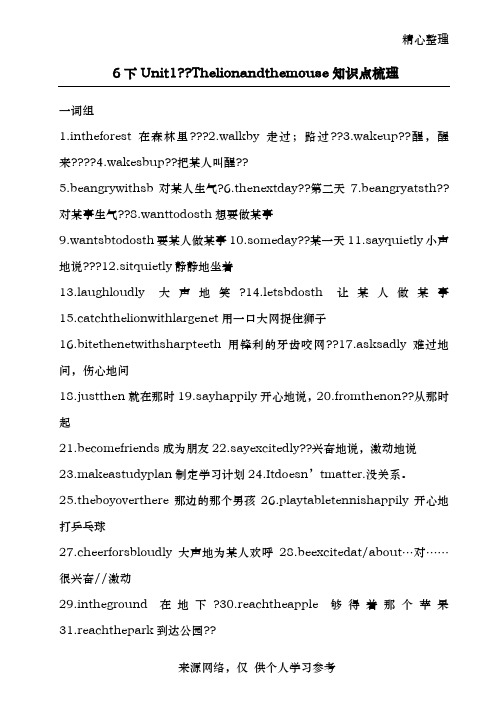
精心整理6下Unit1??Thelionandthemouse知识点梳理一词组1.intheforest在森林里???2.walkby走过;路过??3.wakeup??醒,醒来????4.wakesbup??把某人叫醒??5.beangrywithsb对某人生气?6.thenextday??第二天7.beangryatsth??对某事生气??8.wanttodosth想要做某事9.wantsbtodosth要某人做某事10.someday??某一天11.sayquietly小声地说???12.sitquietly静静地坐着ughloudly大声地笑?14.letsbdosth让某人做某事15.catchthelionwithlargenet用一口大网捉住狮子16.bitethenetwithsharpteeth用锋利的牙齿咬网??17.asksadly难过地问,伤心地问18.justthen就在那时19.sayhappily开心地说,20.fromthenon??从那时起21.becomefriends成为朋友22.sayexcitedly??兴奋地说,激动地说23.makeastudyplan制定学习计划24.Itdoesn’tmatter.没关系。
25.theboyoverthere那边的那个男孩26.playtabletennishappily开心地打乒乓球27.cheerforsbloudly大声地为某人欢呼28.beexcitedat/about…对……很兴奋//激动29.intheground在地下?30.reachtheapple够得着那个苹果31.reachthepark到达公园??32.haveanidea??有一个主意33.bringsomewaterquickly很快拿来水??34.pour…into….??把……倒入……35.Welldone.干得很好。
做的不错??36.somanyballs如此多的求37.somuchbread如此多的面包??????38.take…to…把…….带到…….39.becomehappy变得很开心40.getout 出来,出去二、难点句子1.?Thelionwasangryandwantedtoeatthemouse.这只狮子很生气想要吃那只老鼠。
译林版】6B Unit3考点精练
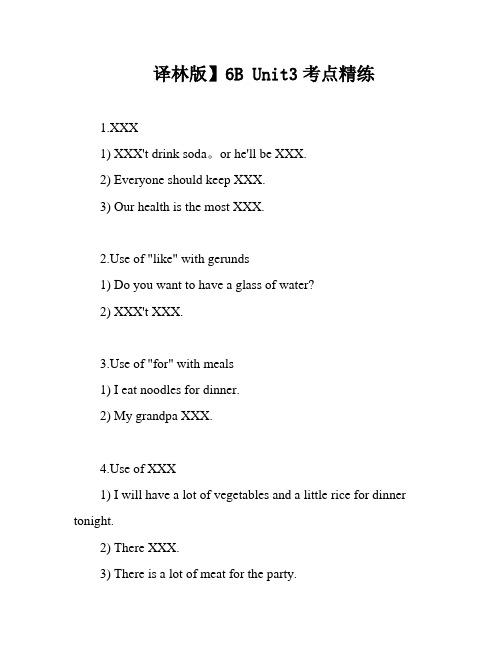
译林版】6B Unit3考点精练1.XXX1) XXX't drink soda。
or he'll be XXX.2) Everyone should keep XXX.3) Our health is the most XXX.e of "like" with gerunds1) Do you want to have a glass of water?2) XXX't XXX.e of "for" with meals1) I eat noodles for dinner.2) My grandpa XXX.e of XXX1) I will have a lot of vegetables and a little rice for dinner tonight.2) There XXX.3) There is a lot of meat for the party.4) Was there any water here just now。
No.5) There are so many buses on the road.6) XXX.1.There are fish in the river.2.My father has too many drinks every week。
but my XXX't.3.There are not many fruits in the fridge.4.XXX sees some drinks.5.There were eight bags of rice in the XXX.6.Do you have any sweets?7.There isn't much food in the fridge.8.Mike sometimes has a lot of XXX.9.I XXX.10.What do you have for breakfast?11.What do you often have for breakfast?12.Can I have some juice?13.Can I have some bread?B.卷:1.XXX。
(完整版)译林英语6BU3考点精练
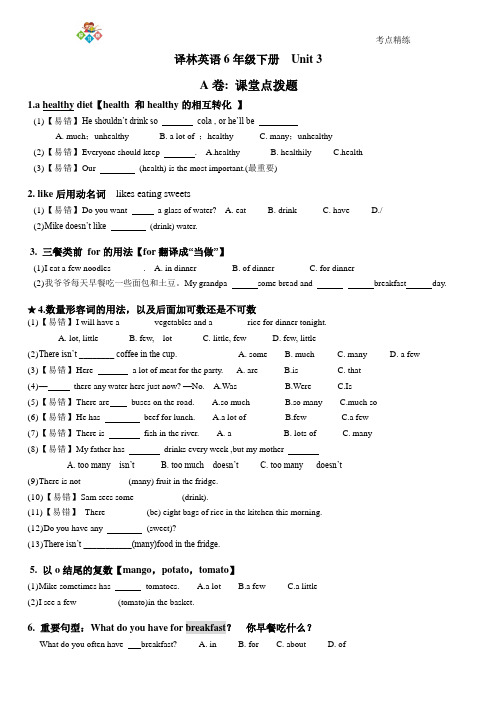
译林英语6年级下册Unit 3A卷: 课堂点拨题1.a healthy diet【health 和healthy的相互转化】(1)【易错】He shouldn’t drink so cola , or he’ll beA. much;unhealthyB. a lot of ;healthyC. many;unhealthy(2)【易错】Everyone should keep . A.healthy B. healthily C.health(3)【易错】Our (health) is the most important.(最重要)2. like后用动名词likes eating sweets(1)【易错】Do you want a glass of water? A. eat B. drink C. have D./(2)Mike doesn’t like (drink) water.3. 三餐类前for的用法【for翻译成“当做”】(1)I eat a few noodles _______. A. in dinner B. of dinner C. for dinner(2)我爷爷每天早餐吃一些面包和土豆。
My grandpa some bread and breakfast day.★4.数量形容词的用法,以及后面加可数还是不可数(1)【易错】I will have a _______ vegetables and a _______ rice for dinner tonight.A. lot, littleB. few, lotC. little, fewD. few, little(2)There isn’t ________ coffee in the cup. A. some B. much C. many D. a few(3)【易错】Here a lot of meat for the party. A. are B.is C. that(4)—there any water here just now? —No. A.Was B.Were C.Is(5)【易错】There are buses on the road. A.so much B.so many C.much so(6)【易错】He has beef for lunch. A.a lot of B.few C.a few(7)【易错】There is fish in the river. A. a B. lots of C. many(8)【易错】My father has drinks every week ,but my motherA. too many isn’tB. too much doesn’tC. too many doesn’t(9)There is not __________ (many) fruit in the fridge.(10)【易错】Sam sees some __________ (drink).(11)【易错】There_________ (be) eight bags of rice in the kitchen this morning.(12)Do you have any (sweet)?(13)There isn’t ___________(many)food in the fridge.5. 以o结尾的复数【mango,potato,tomato】(1)Mike sometimes has tomatoes. A.a lot B.a few C.a little(2)I see a few_________ (tomato)in the basket.6. 重要句型:What do you have for breakfast?你早餐吃什么?What do you often have breakfast? A. in B. for C. about D. of7. Can I have some cola?中some 没有改any(1)【易错】Can I have juice? A. a B. some C. many(2)我能吃一些面包吗?_______ I _______ ________ bread?B卷: 课后巩固题一.选择( )1.______ a healthy diet, there is a lot of fruit and vegetables. A. In B. To C. On( )2.【易错】The child eating ice creams. A.are B.like C.likes D.wants ( )3.【易错】I want big fish. A.to this B.this C.to( )4.Can I have ________ apple juice? A. many B. a few C. much( )5.He has _______ rice for lunch. A. a few B. many C. a lot of( )6.【易错】I usually have _____ porridge and an egg for breakfast. A. a few B. many C. a lot of D. a little ( )7.There is ______ water in the bottle. A. a few B. a little C. any( )8.He eats vegetables for dinner. A. much B. a little C. a few( )9.【易错】In a healthy diet , there a lot ofA. is; vegetables and fruit.B. are; vegetables and fruit.C. are; fruit and vegetables( )10. can help us keep healthy. A.Vegetables B. Vegetable C.The vegetable( )11.--Does he usually any ?--Yes,he does. A. drinks;drinks B. drink;drinks C. drinks;drink ( )12.We eat beans today. A. a lot B. a lot of C. a little( )13.【易错】It is so difficult for her to eat food every meal. A. many B. a few C. a lot of ( )14.【易错】Would you like bread? ─Yes, please. A. a B. any C. an D. some ( )15.Sweet food _____ bad ____ your teeth. A . are ;for B. is; for C. are ;to( )16.I eat a little meat _______ a time. A. at B. in C. on二.填入适当的词1.a little(近义词组) ______2.meat(同音词) ______3.fast(副词) ______4. sweet (形容词)_______5.photo (复数)_________6.tomato(复数)7. healthy(名词)8.noodle(复数) ______9.Fruit and vegetables are (health)food.10.He likes sweet __________ (food).11.There is some __________ (meat) and __________ (fish).12.I have (many) milk.13.【易错】There (be not ) any meat on my plate just now.14.Sam sees some (饮料).15.Do you want any (fruit)?16.Here are some ___________(bottle) of ________(cola) for you .17.I'd like some (fish).18.【易错】There _________(be) a lot of noodles in the bowl.19.【易错】--______ you (do) your homework,Li Ping?--Yes,I am.三.翻译1.休息一下2.喝太多可乐3.不得不回家4.喜欢喝水5.作为早餐6.【易错】几个土豆7.【易错】喝点水8.【易错】需要许多米9.一点米饭10.一个不健康的饮食习惯11.几个鸡蛋12.我最爱的食物13.几个苹果14. 一点果汁15.太多的肉16.甜的食物很好吃,但是对你的牙齿不好。
译林牛津英语6B 3-4单元总结归纳
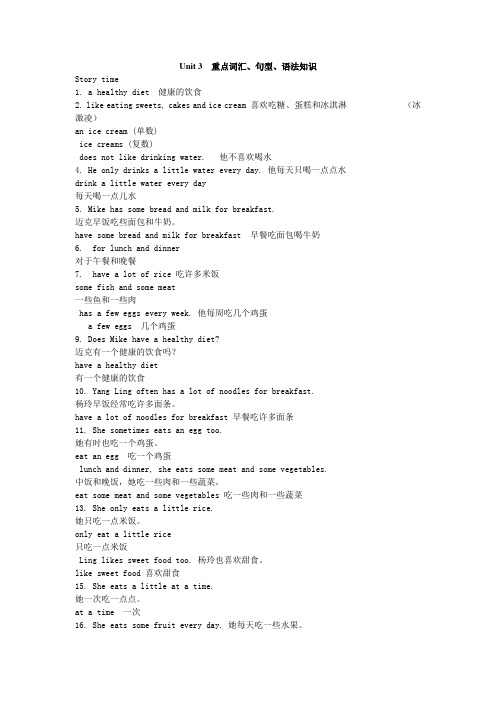
Unit 3 重点词汇、句型、语法知识Story time1. a healthy diet 健康的饮食2. like eating sweets, cakes and ice cream 喜欢吃糖、蛋糕和冰淇淋(冰激凌)an ice cream (单数)ice creams (复数)does not like drinking water. 他不喜欢喝水4. He only drinks a little water every day. 他每天只喝一点点水drink a little water every day每天喝一点儿水5. Mike has some bread and milk for breakfast.迈克早饭吃些面包和牛奶。
have some bread and milk for breakfast 早餐吃面包喝牛奶6. for lunch and dinner对于午餐和晚餐7. have a lot of rice 吃许多米饭some fish and some meat一些鱼和一些肉has a few eggs every week. 他每周吃几个鸡蛋a few eggs 几个鸡蛋9. Does Mike have a healthy diet?迈克有一个健康的饮食吗?have a healthy diet有一个健康的饮食10. Yang Ling often has a lot of noodles for breakfast.杨玲早饭经常吃许多面条。
have a lot of noodles for breakfast 早餐吃许多面条11. She sometimes eats an egg too.她有时也吃一个鸡蛋。
eat an egg 吃一个鸡蛋lunch and dinner, she eats some meat and some vegetables.中饭和晚饭,她吃一些肉和一些蔬菜。
牛津小学英语6B单元练习(Unit3)附听力和答案
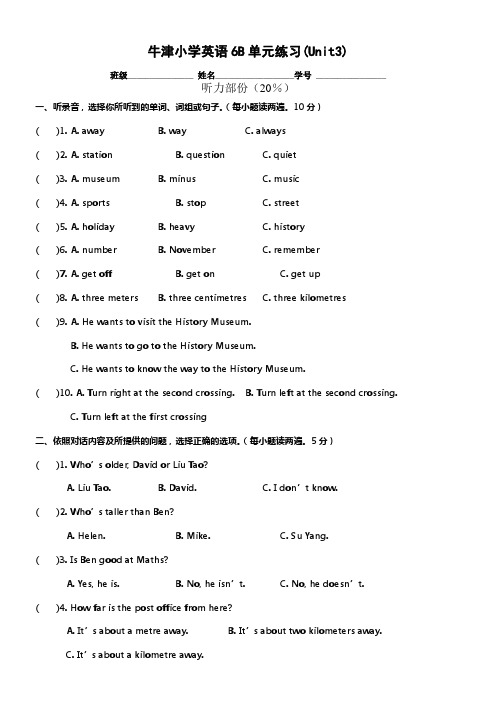
牛津小学英语6B单元练习(Unit3)班级_______________ 姓名__________________学号________________听力部份(20%)一、听录音,选择你所听到的单词、词组或句子。
(每小题读两遍。
10分)( )1. A. away B. way C. always( )2. A. station B. question C. quiet( )3. A. museum B. minus C. music( )4. A. sports B. stop C. street( )5. A. holiday B. heavy C. history( )6. A. number B. November C. remember( )7. A. get off B. get on C. get up( )8. A. three meters B. three centimetres C. three kilometres( )9. A. He wants to visit the History Museum.B. He wants to go to the History Museum.C. He wants to know the way to the History Museum.( )10. A. Turn right at the second crossing. B. Turn left at the second crossing.C. Turn left at the first crossing二、依照对话内容及所提供的问题,选择正确的选项。
(每小题读两遍。
5分)( )1. Who’s older, David or Liu Tao?A. Liu Tao.B. David.C. I don’t know.( )2. Who’s taller than Ben?A. Helen.B. Mike.C. Su Yang.( )3. Is Ben good at Maths?A. Yes, he is.B. No, he isn’t.C. No, he doesn’t. ( )4. How far is the post office from here?A. It’s about a metre away.B. It’s about two kilometers away.C. It’s about a kilometre away.A. In front of the History Museum.B. At the third stop.C. On Zhongshan Road.三、听录音,完成下列句子,每空一词。
牛津小学英语6B_Unit3_Asking_the_way
Thank you very much. That’s all right.
C Look and say
Excuse me, can you tell me the way to the bus station, please?
Go along this street, and then turn left at the third crossing. The bus station is on your left.
Thank you very much. That’s all right.
Read and talk
How can I get to … ?
Homework
1. Read and copy the new words and sentences.
2. Complete the dialogue of part B and copy the dialogue of picture 3&4.
Thank you very much. That’s all right.
C Look and say
Excuse me, can you tell me the way to the WC, please?
Go along this street, and then turn right at the first crossing. The WC is on your right.
1
2
3
4
C Look and say
Excuse me, can you tell me the way to the park, please?
Go along this street, and then turn right at the second crossing. The park is on your left.
(完整版)牛津英语6B期中复习词汇与语法
6B期中复习词汇与语法Unit 1 Great cities in Asia) 1。
It’s _________ walk from my home to that school。
A. fifteen minuteB. fifteen minute’s C。
fifteen minutes D。
fifteen minutes’() 2. It takes her brother 2 hours _________ TV every night。
A。
watch B。
watches C。
watching D. to watch( )3. -_________ does it take him to fly to Hong Kong?—About two hours.A. How manyB. How longC. How muchD. How far() 4。
They are leaving Italy _________ America _________ plane。
A. for, byB. to, onC. in, atD. at, by() 5. —_________ is it from your home to the subway station?—About 5,000 metres.A. How far B。
How long C。
How old D. How often( ) 6。
There are a lot of great _________ in Asia like Shanghai。
A. cityB. cities C。
countries D. country()7。
Beijing is _________ of Shanghai。
A. east B。
south C. west D。
north()8. Japan is _________ the east of China and _________ the east of Asia.A. in, inB. in, to C。
牛津译林版六年级英语下册6B U1-U3单元重点知识总结
6B U1-U3单元重点知识总结Unit 1 Cinderella一、单词。
prince王子 because因为 before 在…以前 late迟的,晚的fairy 仙女 clothes 衣服 fit合适,合身 pick 摘,拾why 为什么 let让 mushroom 蘑菇 understand明白,理解二、词组。
1. at the prince’s house -在王子家2. come and help me -过来帮助我3. my gloves /trousers/T-shirt -我的手套/裤子/T恤衫4. go to the party -去参加聚会5. put on -穿上(衣服)6. try on -试穿7. take off -脱下8. be bad for… -对…有害9. take it off -脱下它10. put them on -穿上它们11. try on the shoe -试穿这只鞋12. try them on -试穿它们13. come back before 12 o’clock-十二点之前回来14. be sad /happy -伤心/开心15. have a good/great time -玩得开心16. at the party -在聚会上17. have to do sth. -不得不做某事18. have to come home -不得不回家19. visit every house -拜访每一户20. fit sb well -很适合某人21. at 12 o’clock -在十二点22. put on the English play -表演(演出)这个英语剧23. have a drink -喝饮料24. draw a dress for her friend -为她的朋友画一件连衣裙25. read stories -读故事26. have some snacks -有一些零食27. at a snack bar -在零食店28. thirsty and hungry Bobby -饥渴交加的波比29. in the forest -在森林里30. find some mushrooms -发现一些蘑菇31. under the tree -在树下32. pick a big red mushroom -摘了一个又大又红的蘑菇33. pick up the book =pick the book up-捡起这本书34. pick them up -把它们捡起来35. leave a shoe behind -把一只鞋子留下了36. don’t understand why -不明白为什么37. foot hurts -脚疼38. be bad /good for… -对…有坏处/好处39. have to -不得不,必须40. leave…behind -留下;丢下41. have some nice clothes and shoes -有些漂亮衣服和鞋子42. don’t have any nice clothes or shoes -没有漂亮衣服和鞋子43. put on the new clothes= put the new clothes on-穿上新衣服44. take off his white jacket=take his white jacket off -脱下他白色的夹克衫三、句型。
【译林版】6B英语Unit3 A healthy diet知识点精心梳理
Unit 3 A healthy diet知识点梳理1. 健康的饮食 a healthy diet (减肥be on diet)healthy “健康的”,形容词。
unhealthy 不健康的;其名词形式:health一个健康的饮食a healthy dietdiet 指为健康或减肥而制定的特别食物;food指一切可以吃的食物。
2. 喜欢吃糖果like eating sweets3. 喝水drink water 喜欢喝水like drinking water不喜欢喝水don’t like drinking waterLike作动词,意思为“喜欢”,后面跟v.-ing,即动词名,表示喜欢做……。
注意与would like to do sth.区别,后者是“想要做某事”。
4. 一点a little 一点儿水a little water 一点米饭a little rice几个a few 几个鸡蛋a few eggs语法 1.a few几个+ 名词复数如: a few eggsa little一点儿+不可数名词如: a little rice如果后面加了可数名词单数的话,则翻译为:一个(只)小的….. a little dog:一只小狗2. few 几乎没有+ 名词复数little 几乎没有+ 不可数名词(a few/a little, 表示肯定;few/little 表示否定)6. 每天every day 每周every week (every+ 名词单数)7. 只有,仅仅only (副词)语法:1. 修饰主语时,only放在主语的前面。
例如:Only you could do a thing like that. 只有你才会干出那样的事。
2. 修饰主语以外的成分时,only 放在句中即实意动词之前、助动词后面、be动词后面、情态动词后面,如果有两个或多个助动词,则放在第一个助动词后面。
例如:I only like swimming in the sea. 我最喜欢在大海里游泳。
- 1、下载文档前请自行甄别文档内容的完整性,平台不提供额外的编辑、内容补充、找答案等附加服务。
- 2、"仅部分预览"的文档,不可在线预览部分如存在完整性等问题,可反馈申请退款(可完整预览的文档不适用该条件!)。
- 3、如文档侵犯您的权益,请联系客服反馈,我们会尽快为您处理(人工客服工作时间:9:00-18:30)。
Unit 3-41. One day,a mouse walked by and woke the lion upby的用法(1)by+地点名词。
表方位,意为:“在…旁边”。
如:by the lake/river/tree/window/door等。
例如:A boy is sitting by the lake. 有个男孩正坐在湖边。
有时可表:“从…旁经过”,多与动词go/walk/pass等连用。
例如:One day, an old man walked by the house.有一天,一个老人从房子旁边走过。
(2)by+交通工具、交通方式名词时,名词前不加冠词,且名词不变复数,意为“通过;由;乘”如:by train等。
例如:He usually goes there by bus. 他通常是坐公交车去那里的。
Why not go by train? 为什么不坐火车去?2.He eats a few eggs.他吃几个鸡蛋。
a few “几个,少量的”后接可数名词且要用复数形式;用于肯定句。
例:There are a few apples on the table. 桌子上有几个苹果。
a little:一点点,用于修饰不可数名词,肯定用法例:There is a little fish in the fridge.There’s only a little soup left. 只剩下一点儿汤了。
a little+可数名词“一只小的……”a little cat/dog/girl/boy...few:“几乎没有”用于可数名词,否定用法。
He has few friends. 他朋友很少。
little:后接不可数名词。
We had little time to do it. 我们没什么时间做此事【注】little还可表示大小。
如:Please accept this little gift.请接受这件小小的礼物。
There are several little towns along the river. 沿河有几个小镇。
(1)a few几个+__________a little一点儿+__________A lot of 许多,既可加__________,又可加__________。
Some/any一些既可加__________,又可加__________。
(2) much修饰__________,意思是“__________”通常用于__________句中many与__________形式连用。
例如:too__________cola(3) Mum, do we need any rice? need意思是“__________”(4) YangLing likes sweet food too, but she eats a little at a a time. at a time 是“__________”的意思。
3.He usually finishes his homework before dinner.one’s的用法:词组有:brush one’s teeth 刷牙do one’s homework 做回家作业one’s代表“某人的”,在句子中要用物主代词来替换它,一般情况下是与主语相呼应。
如:We should brush our teeth every morning. 我们应该每天早上刷牙。
She often does her homework before dinner. 她经常晚饭前做作业。
4. turn(1)n.轮流、依次轮流的顺序E.g .Now it’s your turn to read the text. 现在轮到你读课文了。
It's my turn to use the bike. 该轮到我用自行车了。
(2) v.转变,变成【短语】turn into变成E.g .Water turns into ice. 水变成了冰。
turn ... into ... (使……)成为……E.g. The farmers are turning waste land into rice fields. 农民们把荒地变成了稻田。
5. point v. 指【短语】point at指着;point to指向;point out指出E.g. A l ittle boy pointed at the king and laughed…一个小男孩指着国王并大笑着……The boy pointed at the book and said,“it’s mine.”那个男孩指着那本书说:“它是我的书。
”【辨析】point at & point topoint at习惯上表示指向离说话人较近的事物,意为“指着”,at是介词,着重于指的对象,指人时一般表示粗鲁或不礼貌。
例如:The teacher pointed at the blackboa rd and said,“you must look carefully.”point to多用来表示指向离说话人较远的事物,意为“指向”,to 是介词,强调方向,并不是指着该物体。
例如:He pointed to the house on the other side of the river and said,“that’s my home.”他指向河对岸的房子说:“那是我的家。
”6.we need a lot of rice 我们需要许多米。
一、need:用作情态动词后接动词原形,是“需要,必要”的意思。
没有人称和数的变化。
不论主语是第几人称,不论主语是单数还是复数,情态都词都无形式变化,1.肯定句:主语+need + do +其他。
2.否定式:主语+needn’t+ do +其他。
You needn’t clean the house now. 你不必现在打扫房子。
3.疑问句Need +主语+ do+其他…?need引导的疑问句,肯定回答要用must。
—Need I call him up now? 我需要现在给他打电话吗? ——Yes, you must. 是的,需要打。
—No, you needn’t. 不,不需要现在打。
二、用作实义动词作为实义动词,need后面的宾语可以是名词、动名词、动词不定式或代词,这种情况下,need既可用于肯定句,也可用于否定句和疑问句,构成否定句和疑问句时要借助于助动词do或does。
(一)need to do sth.作为实义动词,need后面需要接带to的动词不定式,表示有义务或责任去做某事。
1.肯定句:主语+need + to do +其他。
You need to take good care of your mother. 你要好好照料你妈妈2.否定句:主语+don’t/ doesn’t/didn’t need + to do sth例:You don’t need to take good care of your mother.你不需要好好照料你妈妈。
3.疑问句:Do/does +主语+ need to do sth?例:Does she need to do the cooking? 她需要做饭吗?Yes, she does.是的,她需要做饭。
No, she doesn’t.不,她不必做饭。
4.特殊疑问句; 特殊疑问词+助动词+主语+need+其他?例:What do we need to take for the picnic? 野餐我们需要带些什么?(二)need + 名词这是need最常见的用法之一,其后的宾语可以是名词,也可以是代词。
如:1). We need a great deal of money now. 我们需要和多钱。
2). They don’t need it any more. 他们不再需要它了。
3). Does your father need any help? 你爸爸需要帮助吗?They need my love and care. 他们需要我的关爱。
(三)need doing表示被动含义=need to be done。
The clothes need washing.这些衣服需要洗了。
= The clothes need to be washed.三、用作名词need作为名词,含义为“缺乏,需要”;其复数表示“基本需要”We are in need of your help.我们需要你的帮助。
A friend in need is a friend indeed. 患难见真情。
There is no need to persuade him to follow my advice.没必要说服他采纳我的意见。
There’s no need for you to start yet. 你现在还不必动身。
There isn’t much need for further research. 没有必要进一步的实验。
satisfy /meet their needs满足他们的需要7.How can you cross the road safely?你可以如何安全的过马路?cross,across和through都有“穿过”的意思,但用法不同。
cross 动词表示动作是从物体的表面上进行的,强调从一端到另一端,如过河,过桥,过马路等。
across 介词表示动作是从物体的表面上进行的,强调从一端到另一端。
cross =v.+across,如:Go across the bridge.=Cross the bridge.through介词它的含义与in有关,表示动作是在某一物体的内部空间进行的。
如穿过一道门,穿过森林、乡镇、城市等。
例句:They walked through the gate with Uncle Wang.【拓展】crossroads是“十字路”或“十字路口”的意思,它的前面可以用a,但-s是不能丢掉的。
例:The accident took place at a crossroads. 车祸发生在十字路口。
crossroad是基督教的用语,指“十字架的道路”,不是十字路口。
《十字架的道路》表示基督徒在信奉基督时要愿意为宗教牺牲,对信徒而言,这是一条很难走的道路。
crossing是“渡口”、“横道线”或“(铁路与公路的)交叉点”。
All car should stop at the zebra crossing. 所有车辆都要在斑马线前停下。
